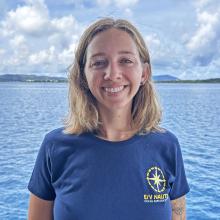
Madeline Davis
Tell us about your work/research. What kinds of things do you do?
I specialize in improving instruments that are used to measure the chemistry of the ocean, specifically for measuring while onboard research vessels. As technology continues to improve, it's important that our methods keep up and improve as well; this means like making the instruments smaller, faster, and easier to use. For my current project, I am working on a method to measure Manganese collected from the ocean's trenches, which can tell us about how the water moves in and throughout the trench. This field is in its early stages, because getting water samples from 10 kilometers down is physically hard to do. It's exciting to be involved in cutting edge science that pushes our current limitations into the unknown!
What sparked your initial interest in your career?
I've always lived near a coastline and I have a lot of experience in aquarium sciences. In addition, I'm very passionate about the ocean, as I am a surfer, scuba diver, and a general beach lover, and so I wanted a career where I felt I could make a difference in learning and teaching others about the ocean. Then, after community college, I decided to move to Hawaii to pursue chemistry and oceanography, and now I am still here working towards my PhD.
Who influenced you or encouraged you the most?
My first oceanography teachers in community college was very passionate and made learning exciting for us. They really encouraged us to get as much exposure in the oceanography field as we could and to one day do our own research.
What element of your work/research do you think is the most fascinating?
The instruments I work with use very tiny amounts of fluid (microliters worth) to create a chemical reaction that we can measure by the color it produces. I think the most fascinating part about my research is tinkering with the chemistry to get it just right; everyday I use all my general chemistry knowledge to predict the results, which is satisfying and exciting to watch!
How did you get involved with the Ocean Exploration Trust?
I am involved as a part of the science team for a cruise to the Mariana's trench, where our team will deploy a new type of technology to gather physical, chemical, and biological information about the trench.
What other jobs led you to your current career?
I have had many jobs and volunteer opportunities that have led me to where I am today. I started by volunteering at my community college aquarium, learning and teaching about how to take care of a variety of saltwater fish and coral. During this time I joined my school's honor society, which were involved in different monitoring programs for California's coastline. Once I transferred to the University of Hawaii at Manoa, I began focusing on getting my scuba certifications, and eventually became a dive instructor. During my undergraduate, I also volunteered in an analytic chemistry lab in the oceanography department, which led to my current position as a graduate student in the same lab. Through this opportunity, I was able to obtain my Masters degree in oceanography, and now working towards a PhD.
What are your degrees and certifications?
Bachelor of Science in Chemistry - University of Hawaii at Manoa 2022
DAN First Aid Instructor - University of Hawaii Dive Safety Program 2022
NAUI Diving instructor - University of Hawaii Dive Safety Program 2023
Masters of Science in Oceanography - University of Hawaii at Manoa 2024
What are your hobbies?
I like to surf and scuba dive. I also like to play pc/Nintendo games
What advice would you give someone who wants to have a career like yours?
If you want to pursue oceanography, it's important to gather as much exposure as possible. Oceanography is a wide field with many sub disciplines, so it's important to choose carefully. The important thing is to try it first before fully committing, so volunteering and doing internships is the key to exposing yourself and networking with people who can help you in the future.
Expeditions
Madeline participated in the following Ocean Exploration Trust expeditions:
